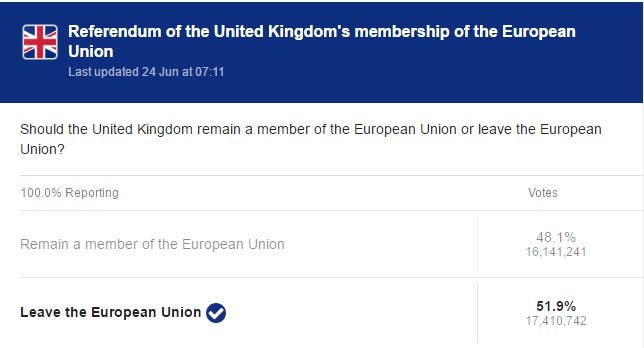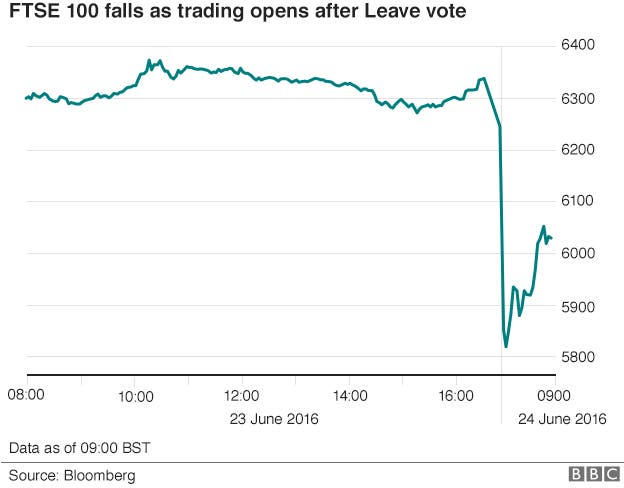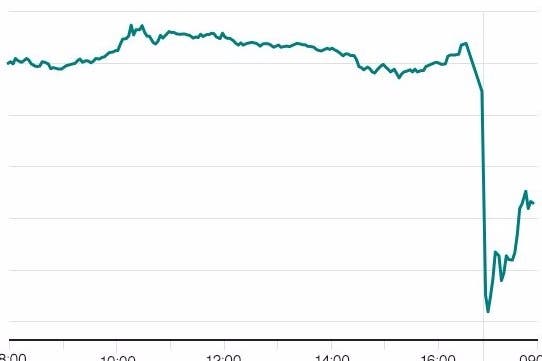What does Brexit mean for the UK video games industry?
"I would be interested to be a fly on the wall in LA, San Francisco and Beijing board rooms right now…"
The UK has voted to leave the European Union in an historic campaign - but what does it mean for the UK video game industry?

The UK is home to a raft of video game publishers and developers, many of which export their games worldwide and hire staff from across the world. What now for foreign-owned developers who have set up shop in the UK?
And what of game prices in the UK? Could Brexit affect the price we pay for games both physical and digital?
Issues that will be particularly pertinent to the UK games industry in the coming months, according to UKIE, include securing access to overseas talent, ensuring we have the right investment in skilling up our homegrown talent, the continuation of the Video Games Tax Relief, and access to funding.
Eurogamer this morning spoke to a variety of companies and spokespeople in the UK video game industry to get their take on Brexit. Most agree: the decision to leave the European Union adds a layer of uncertainty on top of an already troubled industry.
Andy Payne, founder of AppyNation and former UK Interactive Entertainment chairman, told Eurogamer that Brexit could spark a talent deficit.
"We are in uncertain and tough times anyway," he said. "Leaving the EU just pours a load more uncertainty into the pot and that is not good for anyone really.
"Add in the free movement of skilled labour, which EU residents have enjoyed for years, and that could mean we will have a talent deficit until we can train our talent up."
One of the concerns following Brexit is that big game companies that have set up offices in the UK may scale back their future investments.
Companies such as Microsoft, Sony, EA and Ubisoft have all invested in creating development studios and a publishing network in the UK. Microsoft, for example, has Rare. Sony has two London offices, as well as London and Cambridge development studios, and both EA and Ubisoft operate publishing efforts out of Guildford.
And let's not forget the foreign-owned developers we have in the UK, such as Batman maker Rocksteady (owned by Warner) and Grand Theft Auto maker Rockstar North (owned by Take-Two).
"Multinational games companies may reduce their investment given uncertainty around the economic and cultural mood which could ensue," Payne continued.
"Scottish developers will no doubt be back in Europe soon enough, and that may see some relocations of studios taking place north of the border."
Piers Harding-Rolls, director at analyst IHS Technology, told Eurogamer that it's unlikely that game companies could see talent issues in the short term, but long term there could be a real problem.
"In terms of existing staffing and distribution, it will be at least two years before we have a fully negotiated exit from the EU so it's business as usual in the short and medium term," he explained.
"However, the vote result may undermine the ability of UK-based developers to acquire talent from the EU based on the uncertainty it has caused. That could have implications for our competitiveness versus other leading centres of games development."
Following the Brexit confirmation the value of the pound plummeted, sparking concern about the cost of video games in the UK.

Pricing of games and hardware in the UK is tied to local currency exchange rates, so any dramatic change in the value of the pound is likely to have a knock on effect on the price of video games.
Harding-Rolls said any change will probably affect hardware more than software, which may mean Microsoft's upcoming Project Scorpio and Sony's PlayStation Neo will be more expensive in the UK than they would otherwise.
"The impact of Brexit on pricing depends on whether the exchange rate impact is sustained for a long period of time and whether it moderates after this initial shock," Harding-Rolls said.
"There has been at least one example in the past where UK pricing has been increased, specifically for console hardware, in response to a weak pound. Any currency exchange rate swing is more likely to impact console hardware pricing over software, as margins on hardware are generally tighter than on software.
"It's worth noting that we have the most competitive retail environment for games sales in Europe and this keeps our games pricing low compared to mainland Europe. I wouldn't expect the recommended retail price of games on existing platforms to change if the pound's weakness continues, but there may be a moderation on discounting based on reduced margins."
Andy Payne suggests Brexit could make video games cheaper as the pound fluctuates.
"It is likely that imports will get cheaper as our currency rebalances," he said.
"That may mean that physical games could be cheaper, unless of course there are import tariffs again given that all PlayStation games sold in the UK are manufactured in the EU.
"Given that the direction of travel is digital, then a weaker pound could deliver cheaper games to UK residents. But the EU Digital Single Market rules which are not yet agreed, may change a lot for consumers.
"We just don't know yet."
Jason Kingsley, co-founder of Sniper Elite developer Rebellion, called the uncertainty caused by Brexit "unwelcome for business", but insisted the UK video game industry will remain strong.
This concern was shared by UK company Team 17, the publisher of the upcoming Yooka-Laylee and maker of Worms games.
"We are entering a period of uncertainty but the UK people voted and this has to be respected," a Team 17 rep told Eurogamer.
"Team17 are committed to continuing to develop our sustainable business with all of our partners around the world. On a more local level, our hope is that all progress the industry has made thanks to the efforts of both TIGA and UKIE will remain in place (access to finance and favourable tax environment amongst many other things).
"As a creative industry, we rely on talented people, and talented people are spread around the world so we need to make sure we can continue to ensure our industry flourishes despite today's referendum results."
As for the developers, already this morning we've seen a collectively concerned response on social media, with many worried about a potential recession and its impact on the UK games market, and for those foreigners who are working in the UK, a worry they may be forced to leave the country.
There is also a concern among UK game developers that they may now not be able to work at other studios in Europe.
"While changes in pricing would impact consumers, there is a broader threat to the UK games market if the country is thrust into a recession as a result of Brexit," Harding-Rolls said.
"Generally gaming tends to be fairly resilient to a financial downturn, especially at the enthusiast end of the market, but the games market has demographically broadened substantially since 2008, which suggests it may be more exposed to a recession than previously. That could have knock on implications for UK businesses and those overseas games companies that count the UK as an important market." "I would be interested to be a fly on the wall in LA, San Francisco and Beijing board rooms right now," Andy Payne said. "I am sure that many of the big calls that could be made will be made, how that leaves us in the UK remains to be seen."

